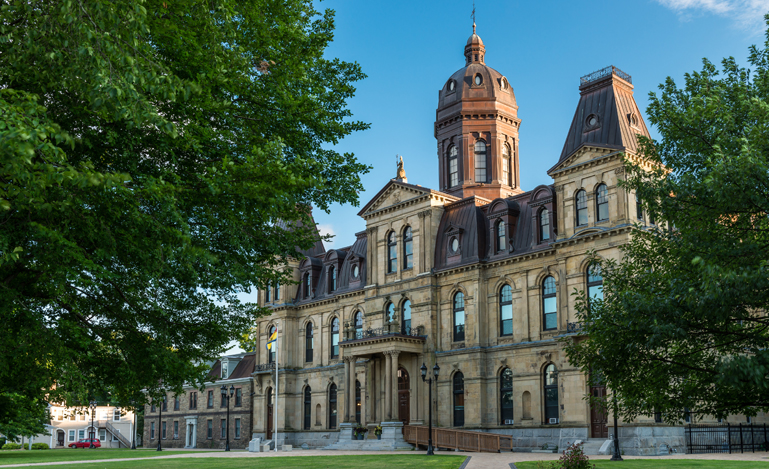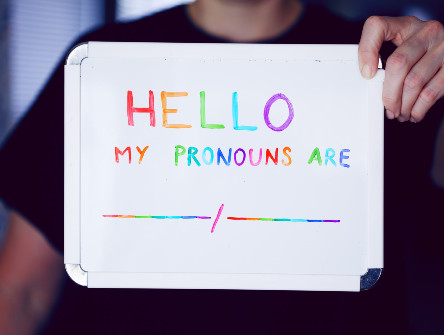What gets lost in using the notwithstanding clause
New Brunswick’s vaccination bill is good public policy and probably violates rights. That doesn’t mean the government should use the override provision.

A government's use of the notwithstanding clause to pre-empt constitutional challenges of legislation that advances the public good is still a bad thing. Even if not invoked for populist reasons (aka "red meat for the base"), as was threatened in Ontario (to protect Doug Ford's legislation reducing the size of Toronto City Council) and used in Quebec (for the "religious symbols" bill, Bill 21), it contributes to a discourse that potentially undermines our rights culture in Canada. All the more so when it is used unnecessarily, as is the case for a recent New Brunswick bill invoking the "notwithstanding clause" to immunize (pun intended) mandatory vaccination legislation from constitutional challenge.
St John, New Brunswick, was the epicentre of a measles outbreak this summer that saw 12 high school students become infected by a peer coming back from a trip to Europe. No one died or was seriously harmed. But as the Globe and Mail reported, it forced immunocompromised students, including one treated for brain cancer, to be effectively placed under "house arrest" for a month during the outbreak. The outbreak happened even though New Brunswick, like Ontario, requires students to submit their vaccination records to attend public school.
In June, Minister of Education Dominic Cardy introduced a bill that would remove religious and conscientious objections as accepted reasons not to immunize school children, leaving only medical exemptions.
During hearings on that bill, Vaccine Choice Canada, a national anti-vaccination group based out of British Columbia, indicated that they would constitutionally challenge the legislation, if passed. Accordingly, after the Legislature was prorogued, the bill was reintroduced (as "Bill 11") and included a "notwithstanding clause" to shield it from a challenge. However, the government did not need this clause for the legislation to survive, as it is based on solid public policy, to which courts will give deference. More likely than not, they would uphold it.
Social media misinformation has contributed to declining vaccination rates and preventable disease outbreaks, with public health strategies to counter anti-vaccination movements largely ineffective (as a recent study by the Canadian Centre for Vaccinology found).
In high-income countries (including Canada), mandatory vaccination requirements work better at increasing rates than attempting to change how people think and feel about vaccines. As might be expected, jurisdictions with exemptions have lower vaccination rates.
"Herd immunity," the percentage of an immune population that protects those who lack immunity, varies. For instance, measles is commonly understood as requiring an immunization rate of 96 per cent for herd immunity. Of those who receive the MMR (measles, mumps, rubella) vaccine, 97 per cent will develop immunity. In other words, there is a very small percentage of students who could avoid vaccination before it has an impact on herd immunity at a school. According to New Brunswick's Department of Education records, the percentage of parents who registered objections to vaccination is two per cent.
No leader of a major organized religion has taken the position that vaccines are impermissible, though some smaller Christian denominations prioritize faith healing. The Dutch Reformed Church and Christian Scientists specifically discourage it. Nevertheless, many individuals have religiously-motivated objections (such as those based on porcine or bovine gelatin ingredients contained in some vaccinations, and the use of tissue from aborted foetuses to develop the MMR vaccine in the 1960s).
As Patricia Hughes has argued, there are several factors that lean towards courts protecting the parental decision not to vaccinate under s.2(a). The test to engage freedom of religion is highly subjective. The effect of a mandatory vaccination requirement likely would be found to have more than a trivial or insubstantial impact on their beliefs. For most families, the personal and financial costs of having to pay for private school or homeschool their children to maintain their religious conviction is also probably significant. While it is true that the Supreme Court has suggested internal limitations to s.2(a) that would exclude practices that harm others, it recently suggested that it is preferable to analyze “the constitutional interplay” of the various rights under section 1. Further, in B.(R.), a majority of the Supreme Court found that providing a life-saving blood transfusion to an infant in contravention to her parents' beliefs as Jehovah's Witnesses was a serious violation of their religious freedom (though it was upheld under section 1).
Of course, many anti-vaccination adherents are not religious, and we have precious little jurisprudence on freedom of conscience under s.2(a). But it would seem anomalous to have a less subjective test for conscience simply because those with fundamental moral commitments akin to religion do not associate them with belief in a higher being. While we may dispute the "facts" upon which these moral beliefs about vaccination are founded, it is of little consequence. Bill 11 likely violates Charter s.2(a).
A section 7 claim is another matter. By now, it is apocryphal that the right to liberty in section 7 includes the freedom to make fundamental life choices without state interference. But the extent to which this encompasses parental freedom to make choices for children that enhances risks to their health or well-being is not completely clear. The Supreme Court in B.(R.) was split on whether parental choices on health care that posed harm to one’s children fall within the scope of liberty. Justice Gérard La Forest speaking for himself and three other members (a majority of those addressing the issue) found that they did. A three-person minority would have found that choices that harm children were completely outside section 7.
Still, one could argue that physical integrity is prima facie infringed via coercive state action to force an unwilling child to receive an injection (even if we accept that the scientific proof that vaccination's health benefits vastly outweigh the risks). This assumes that a court would agree that the infringement of physical integrity (the injection) is caused by state action, versus, say, the parent’s choice to send a child to public school versus private or homeschooling (both accessible choices in the New Brunswick system, upon filing the requisite form).
Even so, the argument that these potential deprivations are fundamentally just is thin. Justice La Forest in B(R) ruled that interfering in parental choice to protect a child's life and health accorded with fundamental justice so long as it is done in a procedurally fair manner. In A.C., another case involving a blood transfusion but concerning the liberty of a "mature minor" to refuse treatment, the only members of the court to address section 7 indicated that non-arbitrary "limits on personal autonomy that advance a genuine state interest" are consistent with fundamental justice (Professor Hughes' argument is similar).
It would be hard to argue that the removal of the non-medical exemption has no connection to student safety (the test for arbitrariness). One study showed that students with exemptions were 22 times more likely to contract measles, for instance, than immunized students. Additionally, given the effectiveness rates of vaccines, the high percentages required for "herd immunity," as well as the objective of protecting immunocompromised persons, it would be similarly difficult for a court to find that mandatory vaccination is overly broad or grossly disproportionate.
Therefore, a section 1 analysis is likely only to be required for a section 2(a) violation. A court would no doubt be guided by Hutterian Brethren, a case where a religious minority sought what appeared to be a reasonable accommodation for their beliefs, namely that they be granted drivers' licenses without a photograph. Then Chief Justice Beverley McLachlin indicated that on minimal impairment, the question was not whether there were alternatives to the regime of mandatory photos but whether there was "an alternative, less drastic means of achieving the objective in a real and substantial manner." That's because non-photographic licenses would pose a "real risk to the integrity of the licensing system."
The parallel with immunization and herd immunity are obvious. This is one of the rare cases where an absolute requirement – or as absolute as possible – is minimally impairing. Furthermore, the court in Hutterian notes that where a limit does not affect the meaningful choice of religious practices but instead imposes an economic cost (hiring drivers, or for anti-vaxxers, paying for private school or home tutoring), highly significant benefits to society will outweigh the detrimental impact on section 2(a) rights. This is especially true in light of the factors warranting deference: protection of vulnerable persons (both student and other immunocompromised persons), weighing scientific evidence, and policy complexity in mediating between competing groups (some of whom are operating under the gross misapprehension of vaccination risk due to social media misinformation).
This is not to say that the constitutional issues involved are simple and that the evidence and arguments for the government are self-evident. No doubt, anti-vaccination advocates have a much different perspective (see, for instance, the brief filed by Vaccine Choice Canada respecting Bill 11's predecessor). But governments should not resort to pre-emptive use of section 33 for reasons of expediency or convenience. When governments use the "notwithstanding clause" to bypass court challenges of otherwise constitutional legislation passed, much is lost. Courts are prevented from providing guidance to lawmakers on the room they have to manoeuvre to pass policy for the public good. Litigants lose the opportunity to bring their grievances before an impartial tribunal and benefit from an objective perspective. And we all lose when use of the "notwithstanding clause," intended to be used exceptionally, becomes normalized. With that, the stability of our rights culture becomes weaker.


